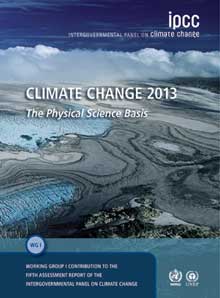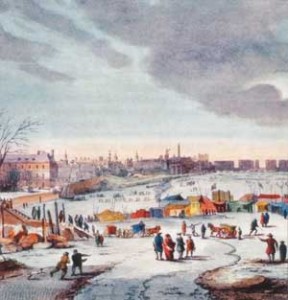With concerns over global warming, historical climatology has emerged as one of the more important cousins of environmental history. Understanding past climates is important because by understanding the nature of long-term trends and climate fluctuations we can place our present experience in an appropriate historical perspective. In addition, by learning how people in the past responded to extreme weather conditions it may be possible to design strategies to cope with climate change. Here is a brief guide exploring the methods and problems of historical climatology and the opportunities that this provides for historical researchers. Continue reading
Tag: historical climatology
Documentary data
To get a more convincing assessment of a statement such as a regular occurrence of Frost Fairs on the River Thames we need sources that include records of frost dates, droughts, famine, the freezing of lakes, ponds and rivers, duration of snow and sea ice cover, and the dates of flowering of plants. Combined, these historical records can provide insight into past climate conditions. Documentary evidence is, however, generally limited to regions with long literary traditions, such as Britain and parts of Europe, China, and to a lesser extent North America. In addition ship’s logs from Spanish, Dutch and English ships crossing the World’s oceans from the 16th through 20th centuries provide new insights into weather patterns and how these change over time (see CLIWOC project and podcast interview with Dennis Wheeler). Continue reading
The Little Ice Age was a period of regionally cold conditions between roughly AD 1300 and 1850. The term “Little Ice Age” is somewhat questionable, because there was no single, well-defined period of prolonged cold. There were two phases of the Little Ice Age, the first beginning around 1290 and continuing until the late 1400s. There was a slightly warmer period in the 1500s, after which the climate deteriorated substantially, with the coldest period between 1645 and 1715 . During this coldest phase of the Little Ice Age there are indications that average winter temperatures in Europe and North America were as much as 2°C lower than at present. Continue reading
 On 27 September 2013 the The Intergovernmental Panel on Climate Change (IPCC) published its highly anticipated summary for policymakers, in advance of its fifth assessment report that will be published in early 2014. This special episode of the podcast, explores briefly the origins of the organisation that produced this landmark report and, in more detail, the difficult international negotiations that have used the IPCC’s findings since its inception. This historical overview ends with the question whether we can learn anything from previous problems of atmospheric pollution, in this case the Great London Smog and the ozone hole, to tackle global warming.
On 27 September 2013 the The Intergovernmental Panel on Climate Change (IPCC) published its highly anticipated summary for policymakers, in advance of its fifth assessment report that will be published in early 2014. This special episode of the podcast, explores briefly the origins of the organisation that produced this landmark report and, in more detail, the difficult international negotiations that have used the IPCC’s findings since its inception. This historical overview ends with the question whether we can learn anything from previous problems of atmospheric pollution, in this case the Great London Smog and the ozone hole, to tackle global warming.
The podcast concludes with a brief interview of historical climatologist Dagomar Degroot and his response to the summary of the fifth assessment report from the perspective of climate history. Dagomar is a PhD Candidate in environmental history at York University in Toronto, Canada.
Relevant web resources
Dagomar Degroot, Understanding the IPCC’s Fifth Assessment Report, HistoricalClimatology.com
Maggie Koerth Baker, “The value of talking about values. It’s time to be explicit about how our beliefs affect what we think should be done with the science of climate change“, Ensia, 25 September 2013.
Met Office, The Great Smog of 1952
Jan Oosthoek, “The IPCC and the Ozone Hole: a Warning from History“, Globalizations, March 2008, Vol. 5, No. 1, 63-66.
Music credits
“Forward” by Northbound, available from Free Music Archive
“Alice In the City” by Doxent Zsigmond, available from ccMixter
“Improvisation On Friday…” by Alex, available from ccMixter

Frost Fair on the River Thames near
the Temple Stairs in 1683-84.
Engraving after a drawing by Jan Wijck.
Source: Wikimedia Commons
For many historical climatologists cold, wet and stormy weather worsened life for most European people and harmed the economy during the early modern period. Warmth on the other hand is generally regarded as a beneficial thing but too much of it is also harmful. This all seems to make sense if one ignores the Dutch economic miracle which transformed a small piece of land on the edge of Europe into the first modern economy just as the Little Ice Age entered its coldest phase. How is this possible in the face of climatic stress?
This is one of that questions that Dagomar Degroot, a PhD Candidate in environmental history at York University in Toronto, Canada, addresses on this episode of the podcast. His research explores the issue of how the changing climate of the Little Ice Age influenced the cultural, military and economic histories of the Dutch Republic during the early modern period. In addition, Dagomar will discuss the pitfalls of determinism and indeterminism in historical climatology, the sources available to historian’s researching climate and the relevance of historical climate research for present day debates about global warming and climate change. Finally, he will talk about the importance of blogging for the historical profession as a tool to communicate research outcomes to a wider audience.
Relevant websites
HistoricalClimatology.com
Climate History Network
CLIWOC
Further reading
Dagomar Degroot, “Does tree ring data reflect global cooling?“, HistoricalClimatology.com, 9 July 2012.
David D. Zhang et.al., “The causality analysis of climate change and large-scale human crisis“, PNAS, October 18, 2011 vol. 108 no. 42, pp. 17296-17301.
Related podcasts
- Climatologist Dennis Wheeler discussing the use of ship logs for historical climate reconstruction on episode 7 of Exploring environmental History.
- Christian Pfister on the cultural memory of extreme weather events, episode 29 of Exploring environmental History.
Music credits
“Where You Are Now” by Zapac
Available from ccMixter
“Flowing Water” by Pitx
Available from ccMixter
In this episode Professor emeritus in history Christian Pfister, Fellow of the Oeschger Centre of Climate Research at the University of Bern examines the cultural memory of extreme weather events. In the past people experienced extreme weather in different ways depending on whether they lived in an agricultural society, an urban environment or in what profession they worked. Political and religious structures also influenced the response to weather related disasters. This coloured the narrative and memory of past extreme weather events and floods. Pfister demonstrates that this qualitative data is surprisingly objective and can be successfully used for climate reconstruction, producing surprising results.
Website mentioned in this podcast
Social, Economic and Environmental History Section, University of Bern (In German)
In this edition climatologist Dennis Wheeler talks about the use of 18th and 19th century ship logs for historical climate reconstruction. The main focus will be on the CLIWOC project. In the autumn of 2006 a second edition of the ground breaking global forest history A Forest Journey: The Story of Wood and Civilization has been published. The author, John Perlin, will reflect in the latter part of this podcast on the importance of forest history and the current situation in which forests have become imperative for humanity’s survival.
© 2024 Environmental History Resources
Theme by Anders Noren — Up ↑
Recent Comments